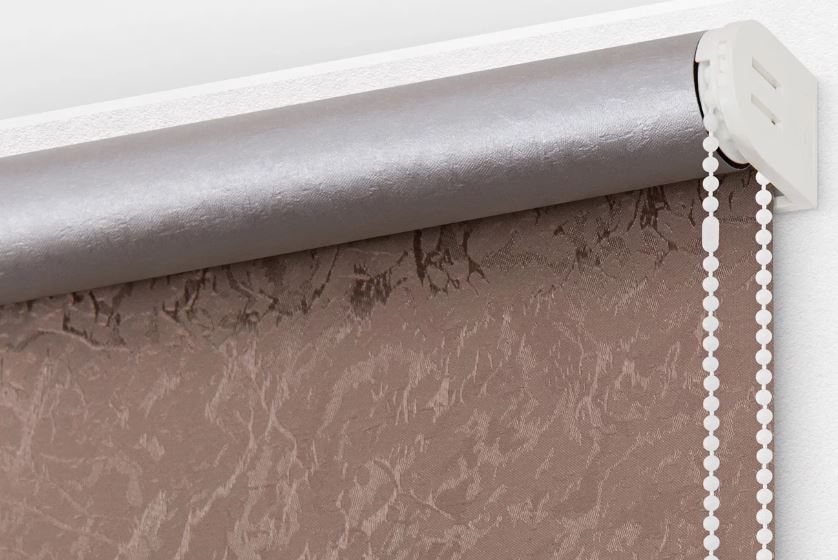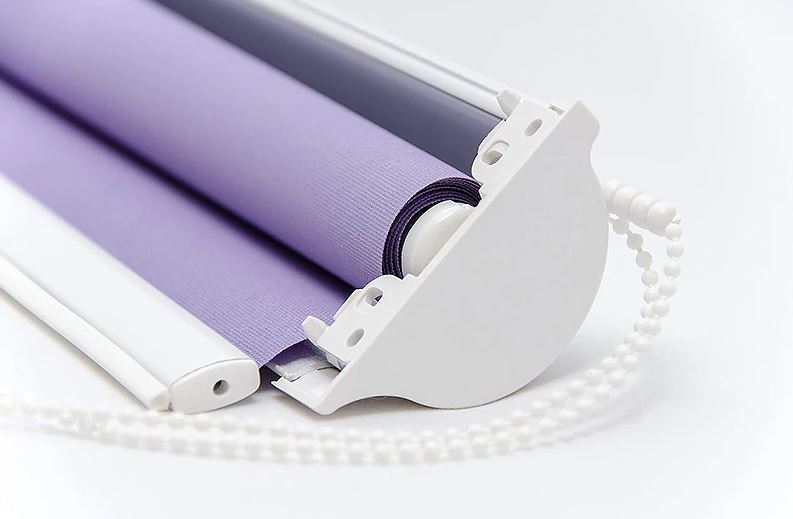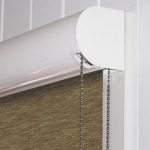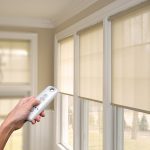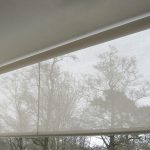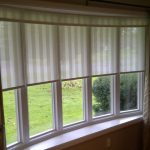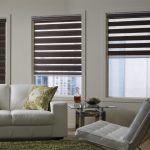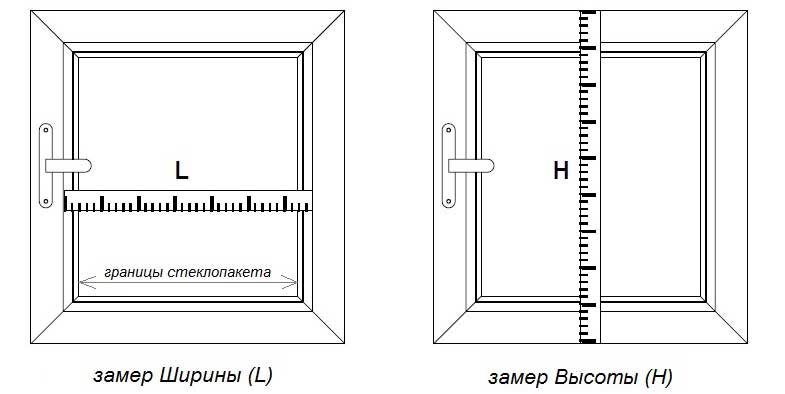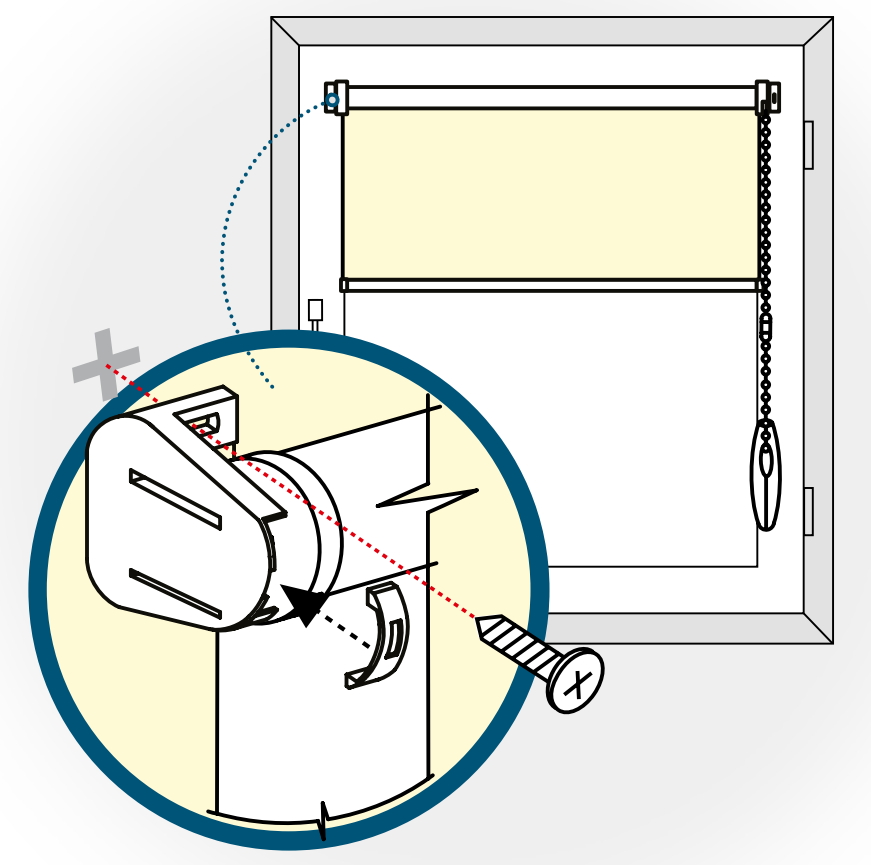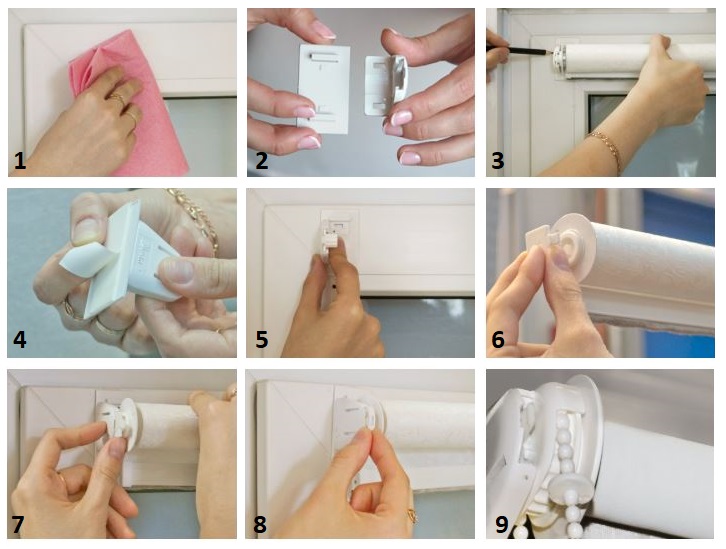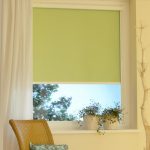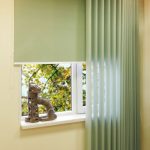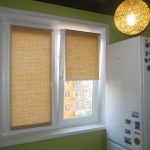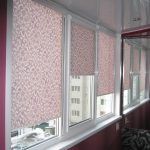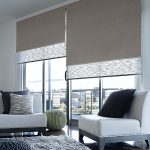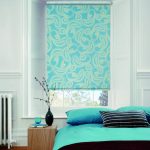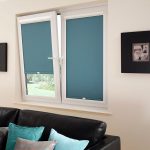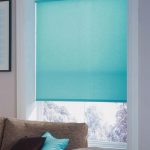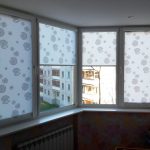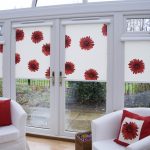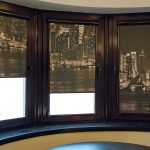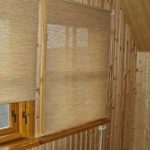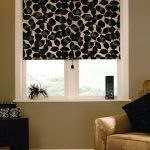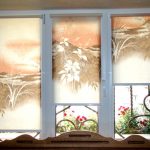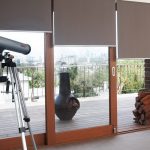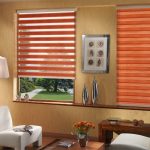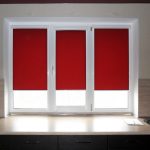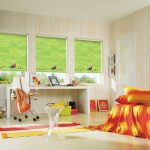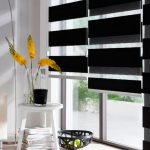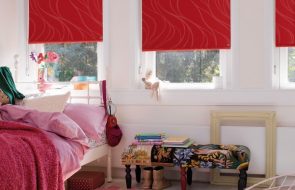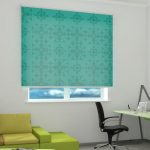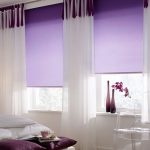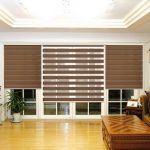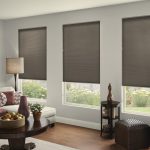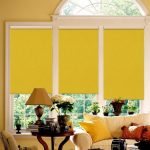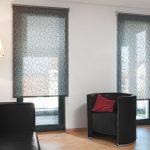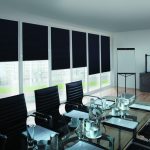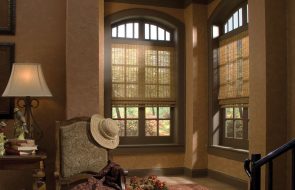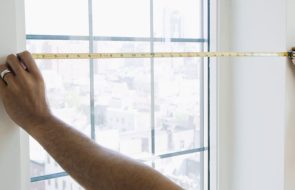The history of using drum-type window curtains goes back a long way. The secret of the popularity of such designs lies in their practicality and ease of control. Over time, roller blinds have learned to be made aesthetically attractive, and not just utilitarian. This has given rise to a wide variety of models. And if Roman blinds create coziness, then roller blinds have greater functionality, although a number of models are not inferior in terms of design and harmony.
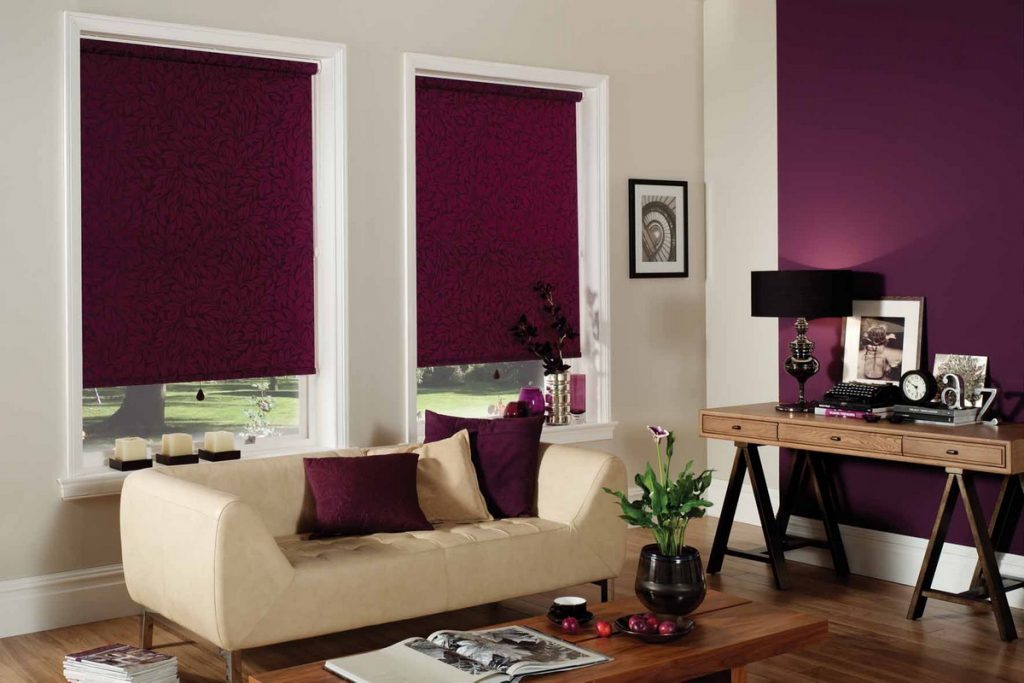
Content
- Roller blinds: types and features
- Advantages and disadvantages of roller blinds
- The device and principle of operation of roller blinds
- Installation of the product and methods for improving the design
- Mini roller blinds for fixed windows
- Strengthening the rigidity of the web by means of guides
- Video on how to cut a roller blind to width
- Photo: roller blinds in the interior
Roller blinds: types and features
In terms of control, these convenient curtains resemble Roman structures and horizontal blinds. Now this type of curtains in combination with conventional curtains is common for apartments and private houses, as well as in business centers. They create a barrier to excessively bright natural light, which not only can interfere with rest, but also affects the preservation of the color of the wallpaper and interior furnishings.
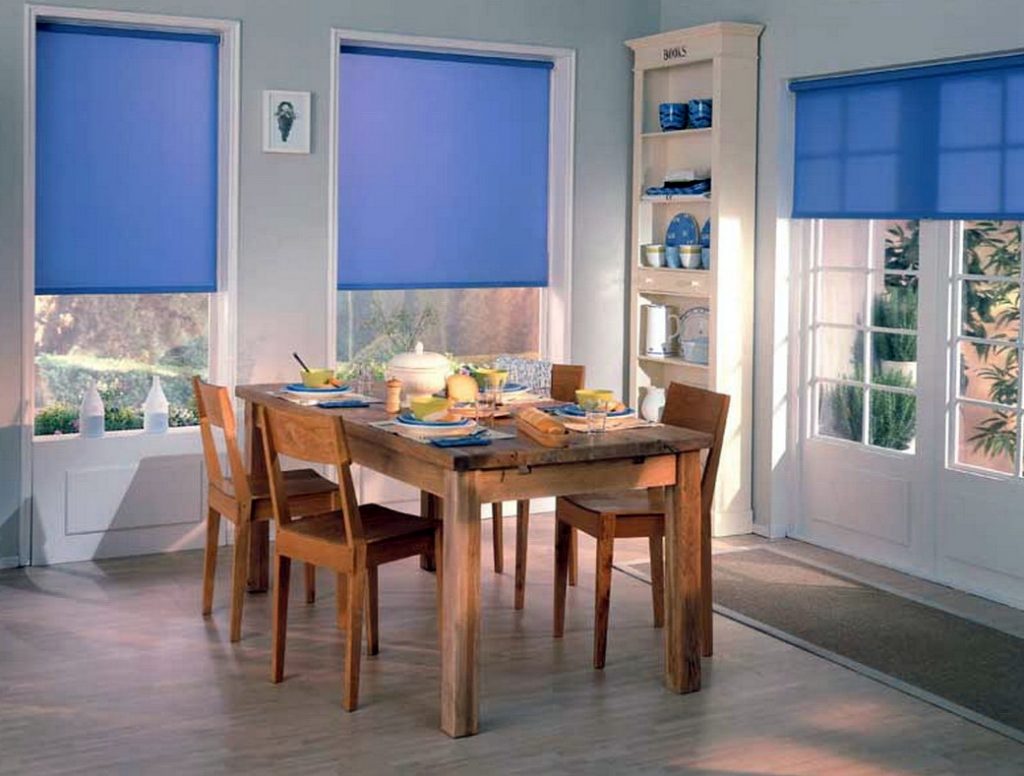
There are several types of roller blinds. Their diversity lies not only in the control method, but also in the system features. There are two main types:
- Open control mechanism. The roller is visible and not protected by a cassette or other type of casing.
Open type roller blind - Closed control mechanism. The roller is hidden under the body, which fixes the canvas quite firmly and does not allow it to crumple or sag. The product acquires a more complete and aesthetic appearance.
Roller blind with protective box
The operating principle of the design may also vary. There are 3 control options:
- using chains;
- by means of an electric drive;
- using a spring holder.
All methods are convenient in their own way. When choosing curtains, focus on many criteria that are individual for each place and lifestyle.
There are 4 types of canvas used indoors:
- completely transparent;
- dimout (light transmission 20-30%);
- blackout (100% opacity);
- "day-night".
Translucent fabrics are used, as well as non-textile materials (bamboo, jute, etc.), which have their own degree of light transmittance depending on the model.
Note! A variety of curtain options (plastic, metal or wooden box/roller) in any color, including white, allow you to choose the one that suits your decor.
Advantages and disadvantages of roller blinds
When preparing to choose a model, it is worth paying close attention to the advantages and disadvantages of this type of design.
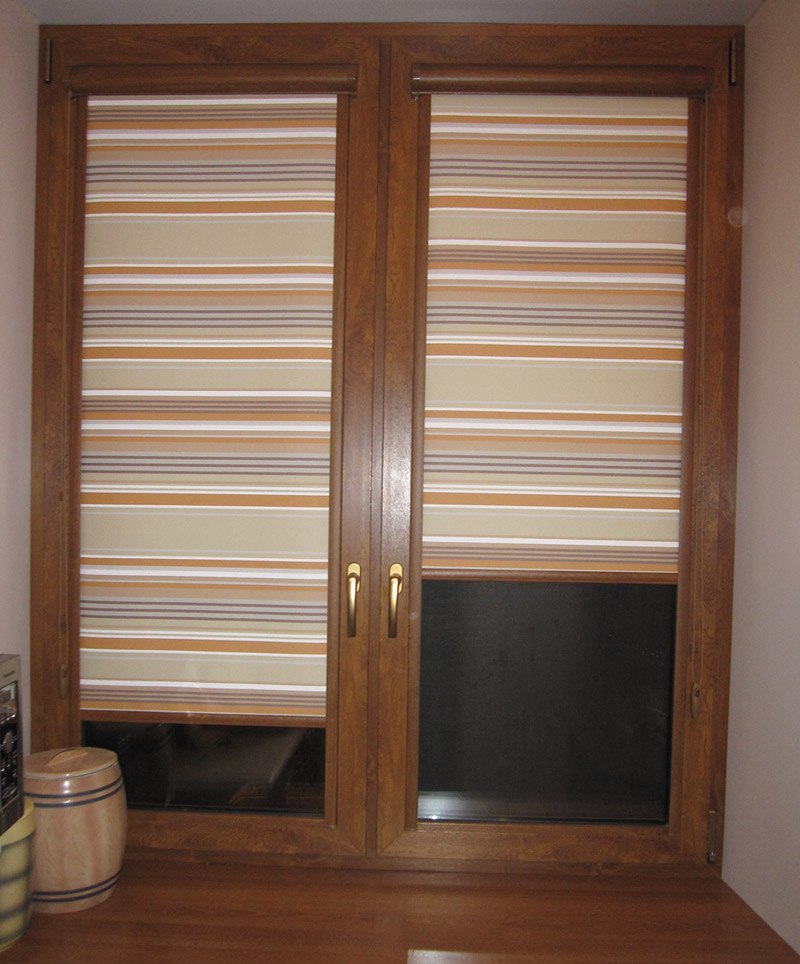
The advantages of roller blinds are as follows:
- Versatility. Possibility of combining models with many interior styles.
- Aesthetics and conciseness. Strict forms in combination with high-quality canvas can transform a living space, attic or loggia into a modern look.
- Practicality. Curtains require minimal maintenance.
- Reliability. High-quality products have a large margin of safety.
- Functionality. With the help of roller blinds, you can provide any level of light access to the room.
- Electric models allow you to control them from a distance (for example, while lying in bed).
- Replacement for curtains. Roller blinds go well with tulle, so there is no need for full-fledged curtains.
- Space saving. This type of curtain does not require the construction of curtains extending beyond the window frame.
- Low cost. You can choose a budget model with a beautiful design.
- For convenience, the products always come with assembly and operating instructions.
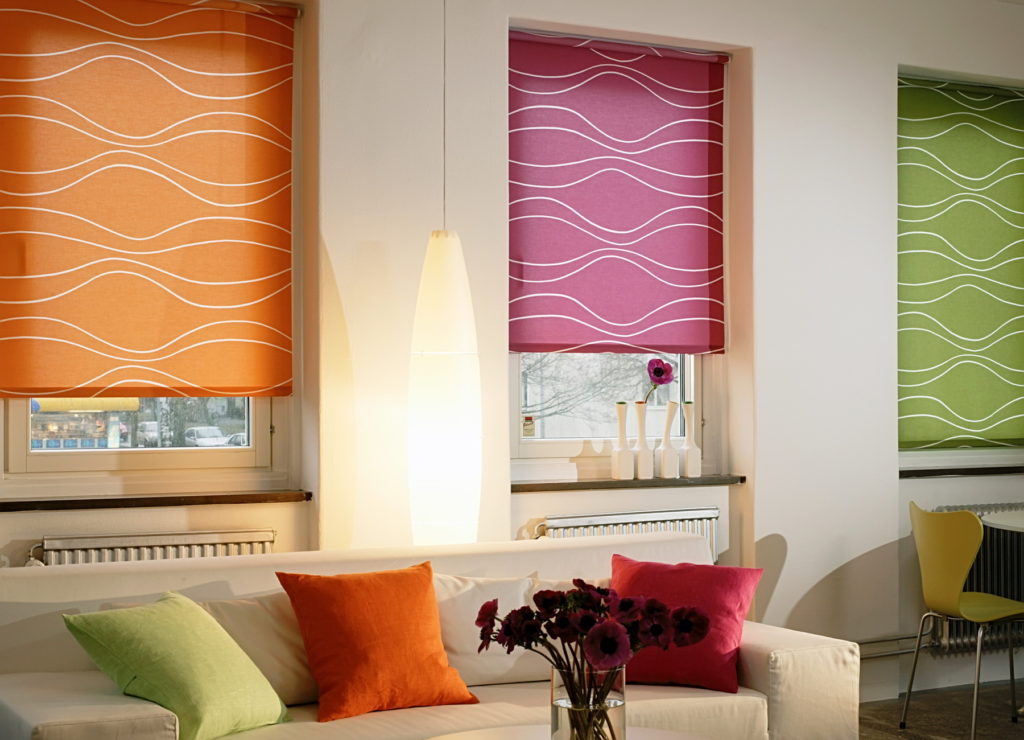
The disadvantages of roller blinds are minimal. They include:
- minimalism (not always compatible with classic style interiors);
- require special installation for plastic windows and structures with transoms (rather not a disadvantage, but a feature).
The device and principle of operation of roller blinds
The bobbin type of construction assumes the presence of several components. The device of roller blinds includes:
- roller with control unit;
- canvas;
- weighted plumb line;
- guides;
- adjustment mechanism.
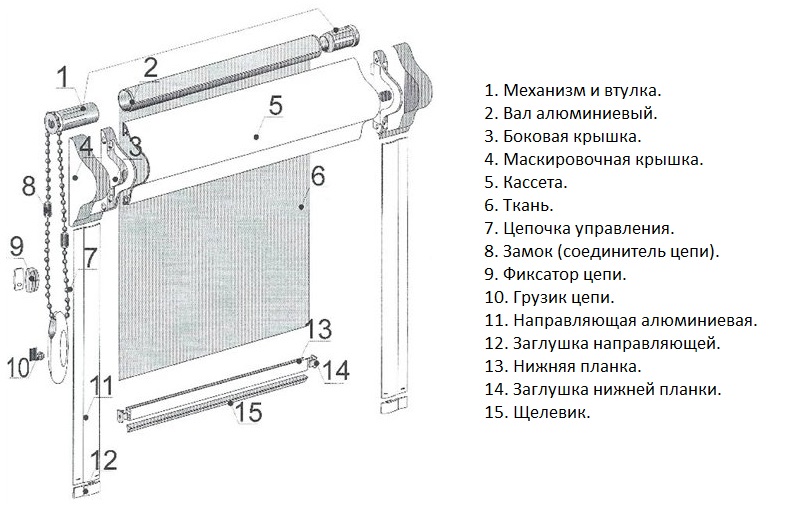
Roller blinds work on the principle of winding and unwinding the fabric on a drum. It is located at the top of the structure. To tension the fabric, there is a weighting device at the bottom - a U-shaped or bar, with the help of which the roll cannot sag or skew.
The classic mechanism is controlled by a chain. In modern models, magnetic stoppers can sometimes be found.
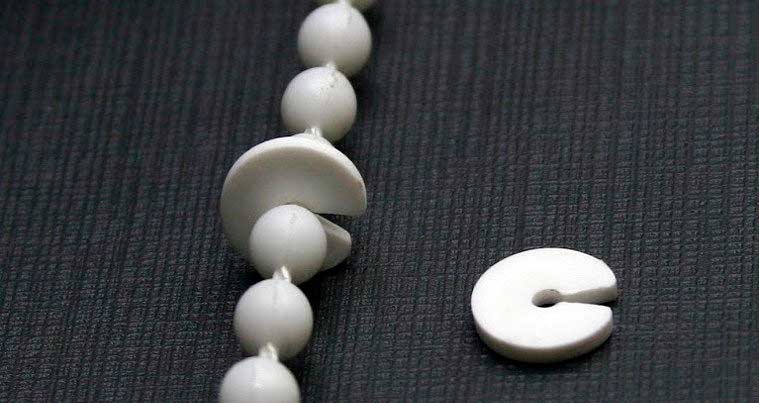
The mechanism controlled by the chain drive has its own peculiarity. The balls on the cord are part of the hinge structure when the roller rotates in one direction or another. They also act as a kind of locks. The finished sample has a chain descent of at least 2/3 of the length of the canvas.
Convenient roller blinds that rise from the bottom up with the help of a spring mechanism. They have good tension. A reliable spring cushions the fabric, which can be fixed in the desired position.
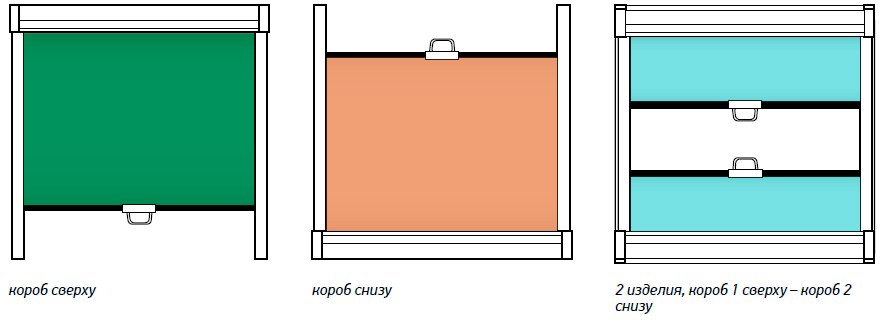
The roll can be wound straight or inversely. The second option is typical for cassette blinds.
The guides help distribute the canvas evenly when scrolling. They also close the sides from gaps.
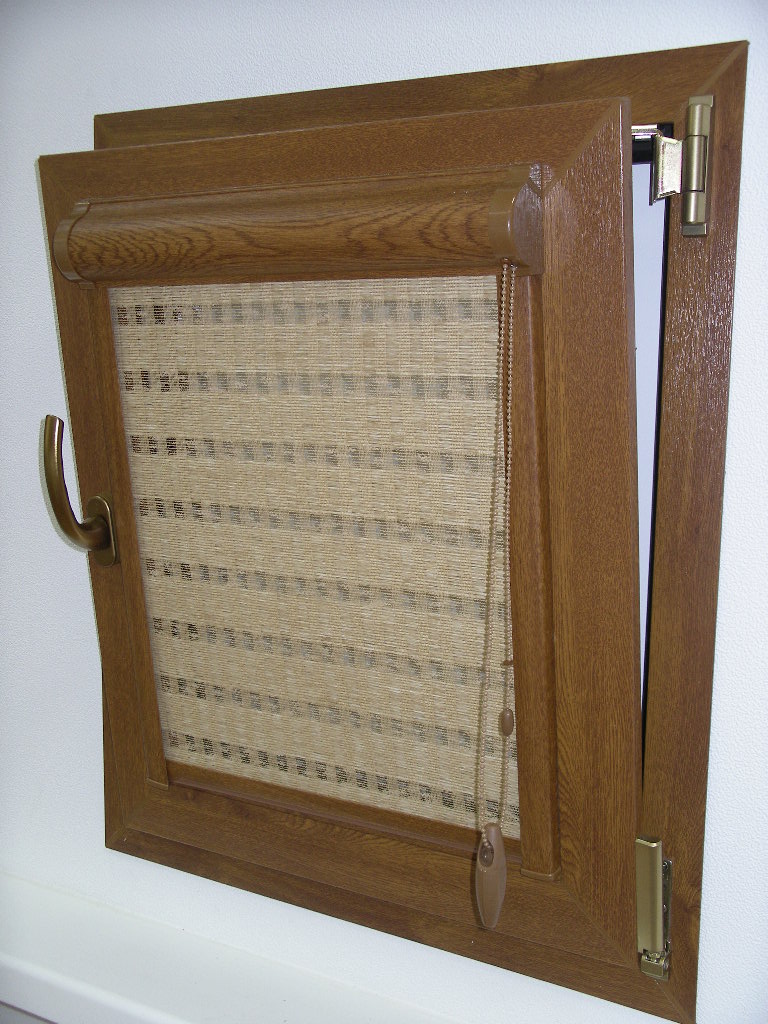
Installation of the product and methods for improving the design
The configuration of windows assumes the use of one or another installation option. The classic installation - mounting flush with the window sill on the wall or ceiling - is not always suitable for roller blinds due to the specifics of the design. But this method is used. Let's see how best to fix the curtains so that they fully fulfill their purpose, depending on the material and design of the opening.
Features of installing roller blinds on a wooden window with a transom
The best option would be to attach the structure to the wall or ceiling, especially if the opening is deep – there is room to open the window. However, not everyone is satisfied with this method in the case of narrow window sills and the presence of curtains/tulle.
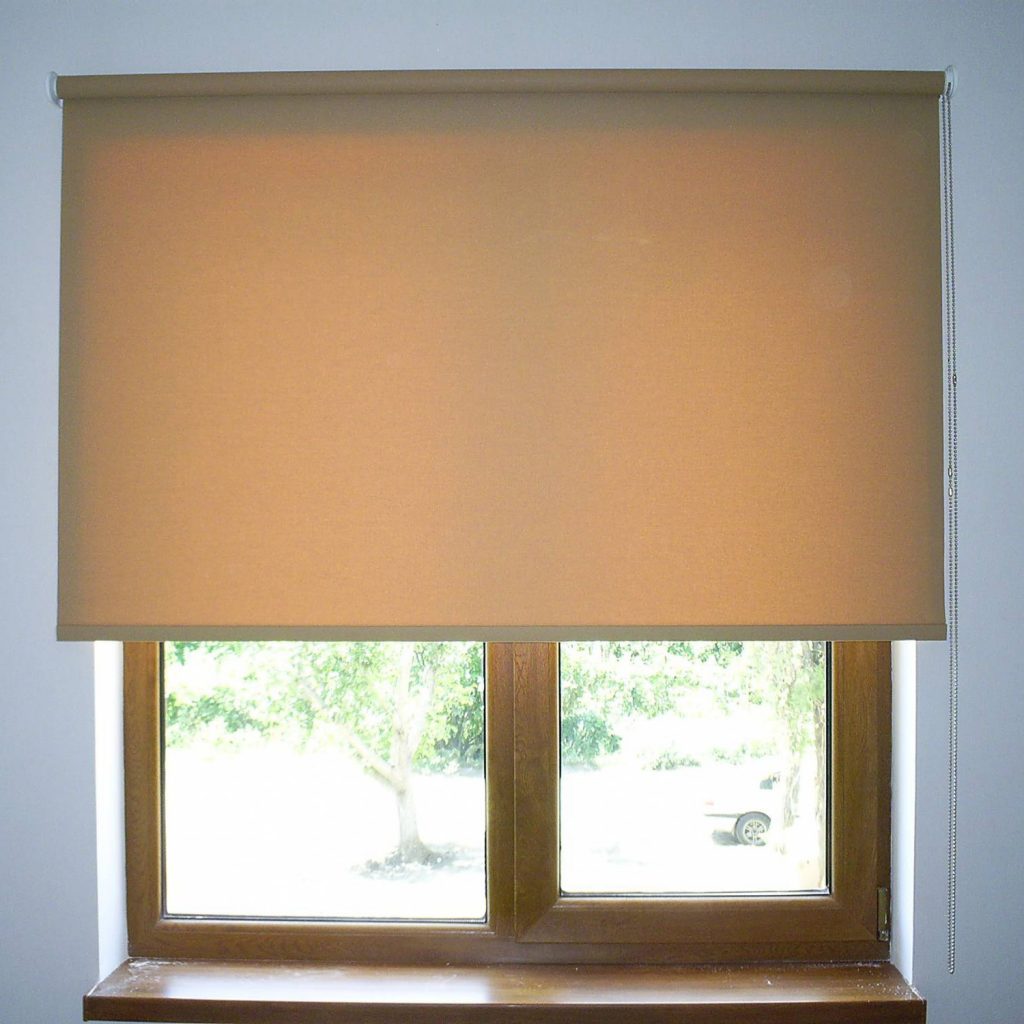
There is one more option - to attach the curtains to the frame taking into account the window. This side can be equipped with two mini-canvases to the size of the parts.
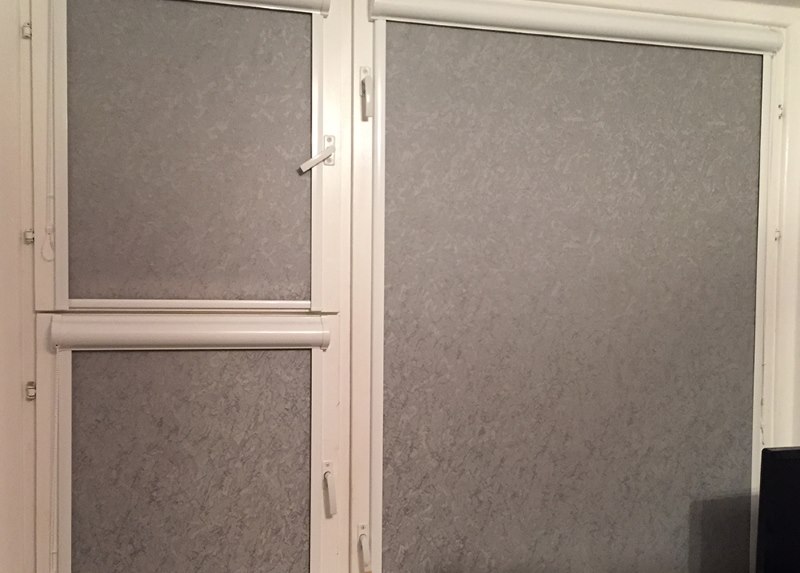
The step-by-step process of fastening is as follows.
- First – assembly of the shaft part. Before that – measurement and calculation of the length and width of the structure. For accuracy of marking, attach the assembled product to the frame.
When measuring, take into account the location of the handle. It is important that it does not interfere with the movement of the curtain fabric. - Brackets with a drum are glued or screwed onto the upper part of the sash.
Scheme of installation of curtains on self-tapping screws with drilling - Drilling holes is done carefully so as not to damage the base. After work, it is necessary to adjust the length of the cord.
- The movement of the web is checked several times, setting it in motion using the chains located on the opposite side from the handles (the control should be free).
This is important! The method of fastening with screws is preferable, since when changing the window design, the holes will be easier to seal and update.
If the fabric is too long, it is recommended to carefully trim the bottom, making an overlap for the weighting agent. It can be inserted through the slot on the side.
Windows with a transom can be decorated with mix series curtains, which have a non-standard unwinding. In them, the roller is attached at the bottom of the structure, and the roll rises from the bottom up.
For brown wooden frames, you can choose a plastic mechanism and a canvas of a similar range or two or three shades lighter. The window looks better if the colors are selected taking into account the palette of wallpaper or curtains. When choosing a range, pay attention to the size of the room. Thus, a lilac shade will visually reduce the space, and a snow-white one will increase it.
For "day and night" designs, it is preferable to mount to the wall rather than to the frame. If necessary, the canvas can also be cut to the desired height.
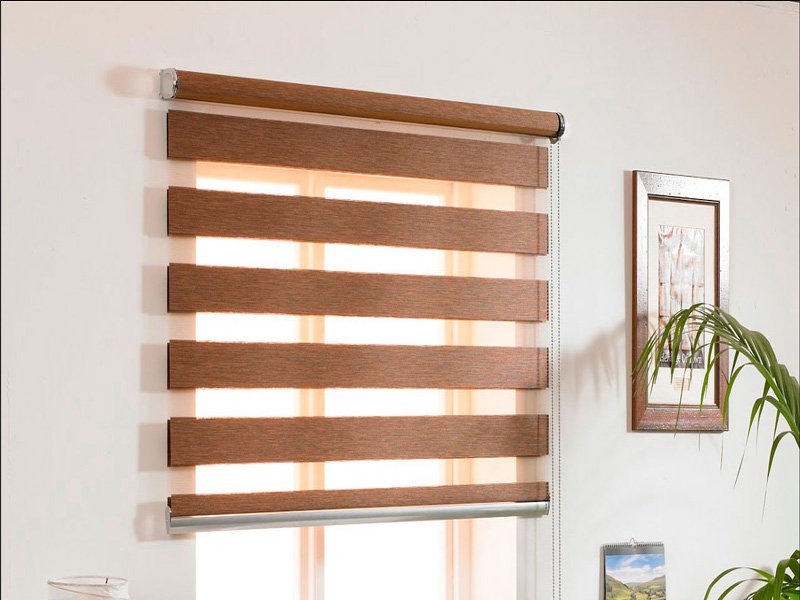
If you plan to mount the device on the ceiling or wall, you need to choose a model with an overlap of the canvas on the sides (up to 3-5 cm) and a curtain of the appropriate length, otherwise after installation, gaps will be visible, visually spoiling the picture.
Features of installation of roller blinds for plastic windows
Any type of roller blinds will work for plastic windows, including exotic ones made of bamboo, etc. They look interesting and unusual, adding their own “zest” to the strict design of the opening.
Self-installation of roller blinds on PVC windows requires special care. It is important to take into account that the design involves opening/closing the sashes in different positions. Therefore, the fabric and other parts of the curtains should not touch the guides and mechanisms of the window.
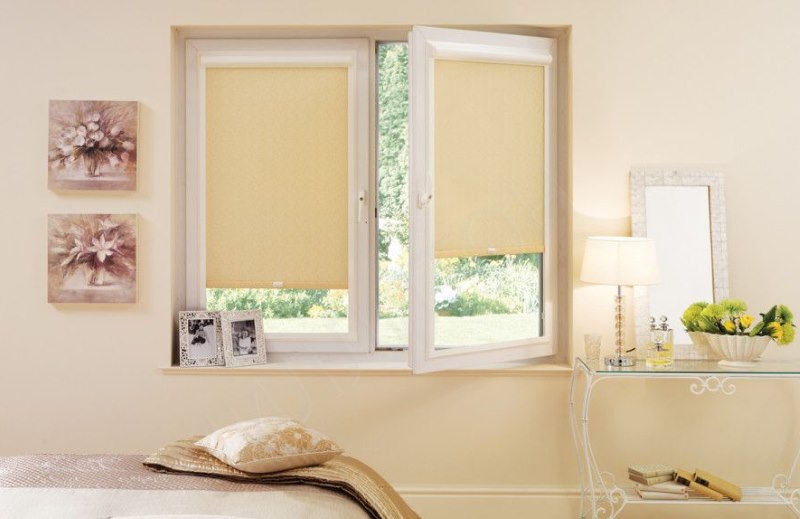
Decorating only frames (or rather, sashes) from polyvinyl chloride is a relatively inexpensive and quick method. It is better to attach the top with double-sided tape or glue, since traces of screws are more difficult to remove if it is necessary to change the decor.
The fastening in the form of double-sided tape can gradually loosen, so it is recommended to hang a light roll on the sash. This method is not recommended for models designed for the entire width of the opening. Installation should be done with the windows closed so that the structure is attached evenly.
The curtain with a drum hidden in a mini-cassette looks very neat on the PVC product. They are ideal for white windows of a corresponding color case.
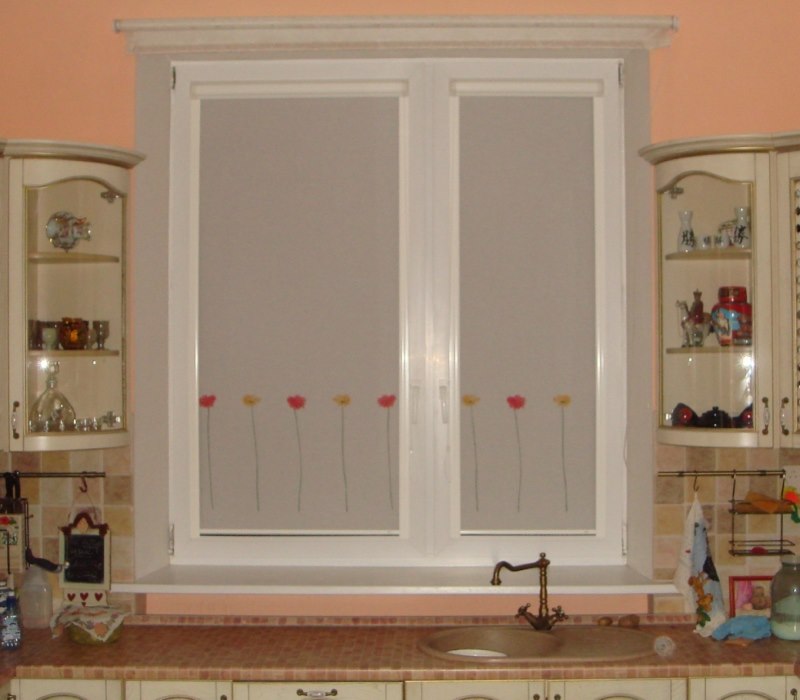
To allow the hand to freely open the sash and fix it with the regulator, the chain is located on the opposite side.
If the canvas is too long, you can shorten it and make a U-shaped weight at the bottom. Due to this balance, the roll will not dangle too much from a draft.
The stages of work are as follows.
- The parameters of the base for the future structure are measured.
- The tape is attached to the roller holder with one side and to the frame of the sash with the other. Instead of tape, you can also use special glue or "liquid nails".
The procedure for installing curtains on tape - The canvas is aligned, the length of the chain and the operation of the roll in the “up-down” position are checked.
The second method is to mount roller blinds with a spring mechanism. The product is installed already assembled.
- Markings are made for the fasteners. Brackets and a drum are installed according to them.
- Covers are placed on the side parts.
- The drive stroke and web tension are checked.
Mini roller blinds for fixed windows
Fully closed sashes sometimes require a single design in the form of roller blinds. When decorating such openings, you can use curtains with mini-rollers.
The kit includes a roller rod, brackets, canvas, fishing line and clamps. To fix the curtain on a fixed window, you need to do the following:
- Determine the size of the future roll by width and length.
- Connect the roller and the canvas as indicated in the instructions.
- Secure the open drum or cassette to the brackets using self-tapping screws (suitable for wooden structures), tape or mounting glue.
- Excess length of the canvas is shortened.
- Along the edges of the roll, from the roller to the bottom, a fishing line is threaded, which is secured with clamps or simply tied tightly at the ends.
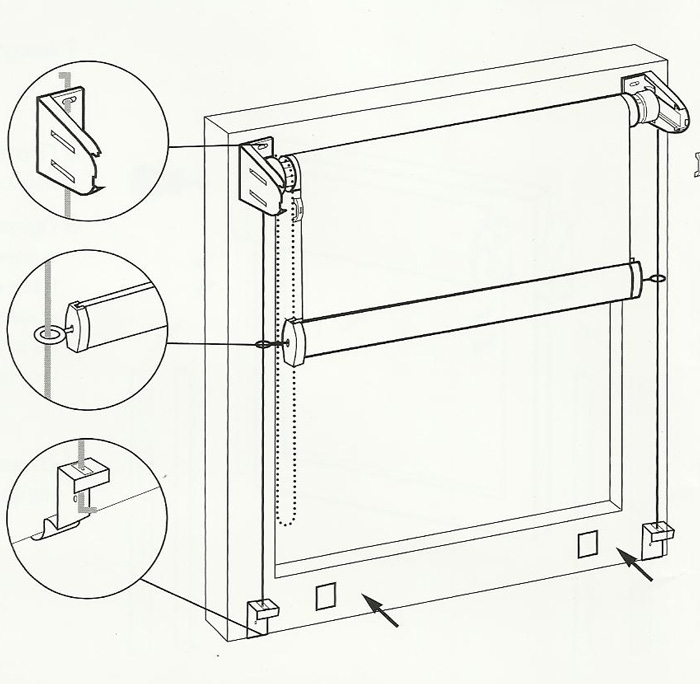
Configuration of roller blinds for non-standard windows can be ordered in specialized stores or salons. They can also help you with installation if self-assembly causes difficulties.
Strengthening the rigidity of the web by means of guides
When installing curtains, you can use an addition that will improve the straightening of the roll when unwinding. This is done using the strings that come with a number of models. They are equipped with special clamps, so connecting them is not particularly difficult:
- It is necessary to measure and cut the strings according to the length of the roll.
- At the bottom, on both sides of the frame, fasteners are attached (with glue or dowels).
- The string is stretched from the roller to the holes on the lower bar and the clamps. This process is described in more detail in the instructions for the purchased product.
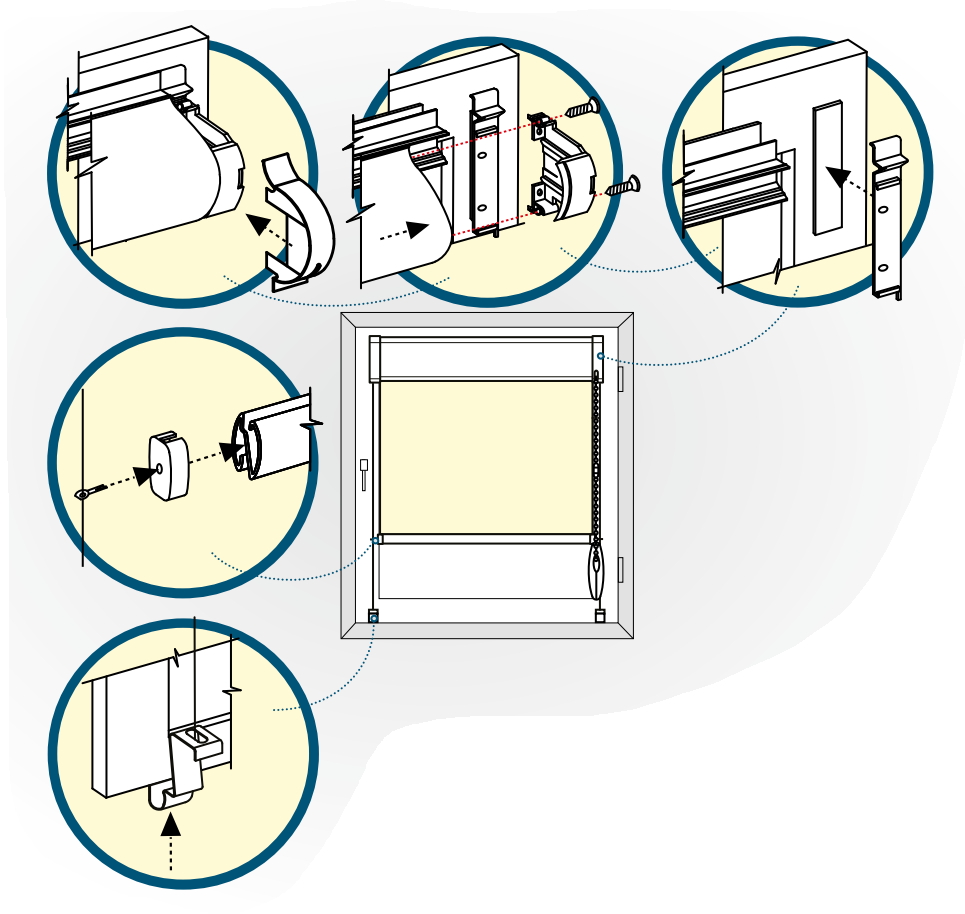
Correctly secured strings prevent the roll from sagging or bending, but rather being even along its entire length, which eliminates the appearance of carelessness and flapping of the canvas under a strong air flow.

